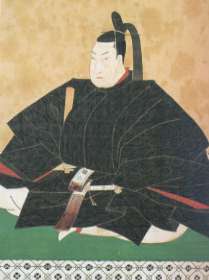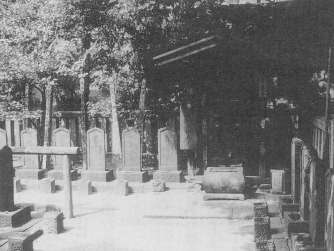 |
| Tougawa-Tsunayoshi |
43p.
Hayahi-Hoko, Keisai Asami,Togai Ito were all scholars who had the
same opinions as Muro-Kyuso.
Sorai Ogyu said, "It is loyalty for the samurai but also true that
forty-six members hade taken revenge on their feudal lord, however,not
everybody in the country will hold this view. If they were put on trial
judged they would have to commit hara-kiri with the samurai's coutasy
as a punishment for committing such a crime. It would fit the country's
morals, and it would be considered that their loyalty was acknowledged
by making their honor of upmost importance." That is, if in his opinion
he admits to causing trouble. Sato-Naokata, Dazai-Shundai and some
others were unsure whether Takuminokami should be punished for
committing this crime or not. They believed it made no sense for them
to carry out an act of revenge on Kira-Kozukenosuke.
Shogun Tsunayoshi asked the bonze(priest) Kobenhoshinno who owned
the Kan-eiji temple in Ueno and the Rinnoji temple in Nikko, but his
opinion was, "Though it is wonderful that samurai in Ako patiently
waited until carrying out the revenge attack, their ambition ultramately
came true. If they wish to leave themselves in the hands of a public
punishment, and their punishment is administered now, they will never
serve for an other feudal lord again. And public law will also remain the
same. This opinion affected the decision of the Shogunate.
 |
| Tombs in Sengakuji temple |
44p
On February 4th, Genroku 16th(1703), Shogun Tsunayoshi ordered
them to commit hara-kiri. They heard about the possibility of hara-
kiri the day before, so they had already put their personal belongings
in order and written their suicide notes.
On the night of February fourth, forty six Roshi committed hara-kiri
and they were buried by their feudal lord's grave. Kuranosuke Ohishi
was forty five years old, the youngest Chikara was sixteen, and the
oldest Horibe-Yahee was seventy seven years old.
In a case like this, the punishment even involved their family at the
time. The Roshi had nineteen boys, and four children over the age of
fifteen were moved to Izu island. They all came home after three years,
apart from one of the four children, Masekyudayu's child Sadahachi
who died on the island.
|